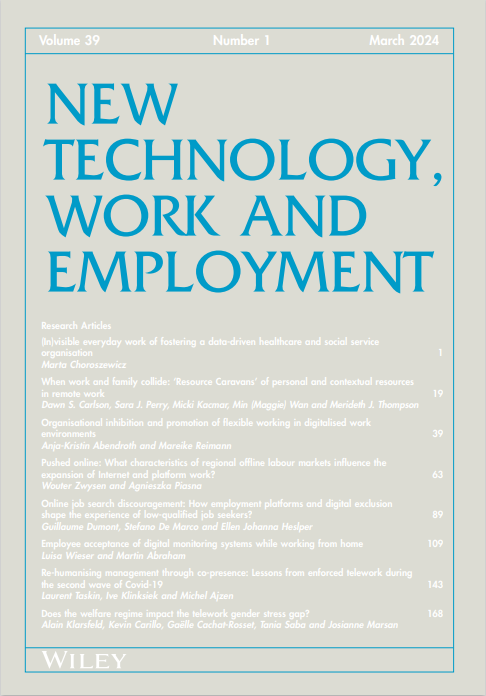员工在家工作时对数字监控系统的接受程度
IF 7.3
3区 管理学
Q1 ERGONOMICS
引用次数: 0
摘要
数字化和COVID - 19导致远程工作安排的扩大,提出了雇主是否以及如何监控远程工作场所的问题。然而,在实施监控方法之前,重要的是要考虑员工对这种方法的接受程度。因此,我们通过实证调查员工在家对绩效监控的评价,为当前的电子绩效监控研究做出贡献。本文分析了某些监控技术如何被认为是不受欢迎的,以及其他工作方面是否可以弥补这些没有吸引力的监控组件。采用实验因子调查设计,德国员工评估随机变化特征的远程工作安排。我们表明,受访者接受在家中进行一定程度的监控,但随着监控系统变得更具侵入性,越来越多的人拒绝接受。然而,在某些情况下,家庭监测的负面影响可以通过某些激励措施减轻,例如金钱或监测的目的。本文章由计算机程序翻译,如有差异,请以英文原文为准。
Employee acceptance of digital monitoring systems while working from home
Abstract Digitalisation and COVID‐19 led to an expansion of remote work arrangements, raising the question of whether and how employers should monitor remote workplaces. However, before the implementation of monitoring methods, it is important to consider employees' acceptance of this approach. Therefore, we contribute to current research on electronic performance monitoring by empirically investigating employees' evaluations of performance monitoring at home. This paper presents an analysis of how certain monitoring technologies for work‐from‐home arrangements are perceived as undesirable and whether other job aspects can compensate for these unattractive monitoring components. Using an experimental factorial survey design, German employees evaluated remote work arrangements with randomly varying characteristics. We show that respondents accept a certain degree of monitoring at home but increasingly reject monitoring systems as they become more invasive. However, in some cases, the negative impact of monitoring at home can be mitigated by certain incentives, such as money or the purpose of monitoring.
求助全文
通过发布文献求助,成功后即可免费获取论文全文。
去求助
来源期刊

New Technology Work and Employment
Multiple-
CiteScore
10.50
自引率
15.50%
发文量
36
期刊介绍:
New Technology, Work and Employment presents analysis of the changing contours of technological and organisational systems and processes in order to encourage an enhanced and critical understanding of the dimensions of technological change in the workplace and in employment more generally. The journal is eclectic and invites contributions from across the social sciences, with the primary focus on critical and non-managerial approaches to the subject. It has the aim of publishing papers from perspectives concerned with the changing nature of new technology and workplace and employment relations. The objective of the journal is to promote deeper understanding through conceptual debate firmly rooted in analysis of current practices and sociotechnical change.
 求助内容:
求助内容: 应助结果提醒方式:
应助结果提醒方式:


